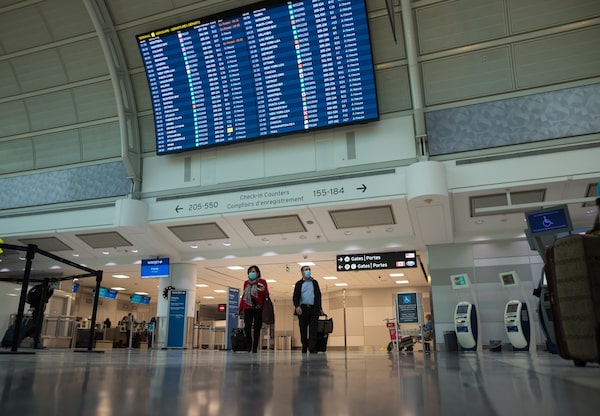
Pearson International Airport on Dec. 16, 2021. Since Sunday, Europe, Canada and the United States have issued executive orders saying they are closing their airspace to planes controlled by Russia.Tijana Martin/The Canadian Press
An Antonov cargo plane that carried COVID-19 test kits to Canada has been grounded at Toronto’s Pearson Airport as part of the international response to Russia’s invasion of Ukraine.
The plane, which is owned by a Russian company, has been grounded for most of this week after flight bans imposed by the West disrupted travel for some of the world’s most massive freighter jets.
Since Sunday, Europe, Canada and the United States have issued executive orders saying they are closing their airspace to planes controlled by Russia. The orders affect several Antonov An-124s, a cargo plane known for its unique carrying capabilities since it went into production in the 1980s-era Soviet Union.
Fewer than 60 Antonovs were ever made, and less than half are still in use. Distinctive for their expansive, nose-loading cargo bays, they can carry more than 150,000 kilograms.
Ottawa warns Canadians against fighting for Russia in Ukraine
Canada to send more troops to Europe, slap fresh sanctions on Russia over Ukraine
Several Antonovs are controlled by the Volga-Dnepr Group, which is based in Ulyanovsk, Russia.
The Volga-Dnepr Antonov that landed in Toronto early on Sunday was ferrying supplies ordered by the Canadian government. “Public Services and Procurement Canada can confirm there were federally purchased rapid antigen tests on board,” departmental spokesperson Michele LaRose said.
It landed at 7 a.m. Later that morning, Transportation Minister Omar Alghabra announced Canadian skies were off-limits to Russia.
“On Feb. 27, Canada closed its airspace to all Russian-owned and operated aircrafts,” said Laurel Lennox, a spokesperson for the minister. “This measure came into effect immediately.”
She did not respond to questions about whether Mr. Alghabra would issue a temporary travel clearance to allow the cargo jet to leave Canada. “This measure is in effect until further notice,” she said.
In an e-mailed statement to The Globe, the Russian cargo jet company said it is looking towards the “settlement of all formalities to be able to fly to its home base.”
“Volga Dnepr Airlines operated a series of charters in the interest of the Canadian government delivering vital COVID-19 related products from China,” the company said.
Ukraine-based Antonov Airlines’ continues to fly other Antonov cargo jets. However, its iconic flagship – an Antonov An-225 known as Mriya – was destroyed last week during the sudden invasion.
“The biggest plane in the world ‘Mriya’ (The Dream) was destroyed by Russian occupants,” the Ukrainian government tweeted on the weekend. “We will rebuild the plane.”
The Mriya was the world’s only Antonov An-225, and it was often regarded as an astonishing feat of engineering. The craft had nearly double the carrying capacity by weight of a standard Antonov. When it landed in Canada in 2020, it was greeted by cheering crowds of aviation enthusiasts.
Over the past two years, logistical bottlenecks related to the COVID-19 pandemic and an ocean freighter that became stuck in the Suez Canal in 2021 have hindered global trade. Some experts fear that the new constraints on large cargo planes may further complicate supply chains.
While other cargo planes can be used to ship big industrial equipment, Antonovs specialize in lifting superheavy and outsized machinery. These cargo planes are also relatively easy to load and offload.
U.S.-based Boeing, which manufactures its own large cargo jets, had been shipping some aircraft parts used in the manufacture of its own planes aboard Russian-owned Antonovs for the past year. “We’ll work closely with our wide range of supply chain and logistics partners to manage through any potential impacts,” said Jim Proulx, a Boeing spokesperson.
Dan Morgan-Evans, a cargo manager for the London-based brokerage Air Charter Service, said the Antonovs that remain in service are carrying cargo “pretty much non-stop.”
“There’s not many of those airframes around,” he said, adding that the reductions in allowed cargo flights “cause real restrictions in capacity for that kind of specialist niche aircraft.”
Mr. Morgan-Evans said the loss of the Mriya is a “devastating blow” to the aviation industry. “It’s kind of the Holy Grail, the pinnacle of aviation,” he said. But he added that “an airplane is an airplane, and it’s nothing to [compare] with the lives being lost in this pointless invasion.”
In the Northwest Territories, a passenger plane from Russia was also grounded this week. “The government of Canada is aware of a charter aircraft that landed in Yellowknife, NT, on March 1, 2022, carrying two Russian foreign nationals,” Transport Canada spokeswoman Sau Sau Liu said.
Government officials are investigating whether the flight violated the Transportation Minister’s order. “At this time, the aircraft is restricted to the Yellowknife airport, pending Transport Canada’s assessment.”
Our Morning Update and Evening Update newsletters are written by Globe editors, giving you a concise summary of the day’s most important headlines. Sign up today.
 Colin Freeze
Colin Freeze